A month late it may be, but I think that extra reflection gave me a more accurate read on which movies really knocked my socks off. Some faded a little after the initial excitement, while others that just wouldn't leave me be. Apologies to the nine that just missed out: Blast of Silence, The Connection, In Search of the Castaways, The Man Who Shot Liberty Valance, The Miracle Worker, Mr. Hobbs Takes a Vacation, Mothra, Phaedra, and Taras Bulba.
Now, without further blah-blah: my top ten films of 1962, in alphabetical order:
Billy Budd
dir/pr: Peter Ustinov
scr: Peter Ustinov and DeWitt Bodeen
cin: Robert Krasker
A hat-tip to Ms. Walz from 11th grade for introducing me to this movie. Perhaps because it's working off a dramatic adaptation already, it makes not-instinctively cinematic source material into an engaging drama, the actual tension coming from actions, looks, the meaning between the words actually spoken. Detailed sets (I love Captain Vere's bed), rather lovely nighttime photography. One gets a real sense of the community of the ship, a genuine crew that's established during the opening credits before you see any one of them. Great performances from all, especially Robert Ryan's master-at-arms Claggart, whose gaze at Billy Budd seems a little more complicated than mere disdain.
Cape Fear
dir: J. Lee Thompson
pr: Sy Bartlett
scr: James R. Webb
cin: Samuel Leavitt
Not a horror film, still terrifying. That's 100 percent due to Robert Mitchum's performance as Max Cady, whose charming smile, relatably casual molasses speech style, and erotic glances belie his sadistic nature - even when a woman goes home with him willingly, he's not satisfied until she's left bruised, bleeding, broken. Too, Gregory Peck upends his image as the man of moral clarity (To Kill a Mockingbird is, you recall, the same year) to play someone more capable of pursuing the grey areas of justice than he thought he was. Adapted from John D. MacDonald, and much as I like Darker Than Amber, it's probably the best film to have captured the weariness with which he communicated his sense of right and wrong.
The End of Summer
dir: Yasujirô Ozu
pr: Sanezumi Fukimoto / Masakatsu Kaneko / Tadahiro Teramoto
scr: Kôgo Noda & Yasujirô Ozu
cin: Asakazu Nakai
The movie that most surprised me with its staying power. An ensemble film about a family whose members confront what and who they want in relationships, often to the frustration of everyone around them. It's not bombastic, there aren't huge emotional scenes, and the closest it comes to a protagonist is the most polite person in the film, one whose only real boat-rocking is the fact that she just doesn't call a potential suitor back. But it moved me! It so fondly captures the unspoken intimacies between among siblings and parents, the winks and nods and glares and deferrals. The universal language of family.
Flame in the Streets
dir/pr: Roy Ward Baker
scr: Ted Willis
cin: Christopher Challis
One would expect a drama like this - union leader fights for the promotion of a Black worker but winces at his daughter's wish to marry a Black man - to end with its characters all taking a giant step towards racial harmony and understanding, them against the world. One especially expects some kind of "I've learned the error of my ways" moment from the wife (Brenda de Banzie, just...perfect), who screams the n-word multiple times in a fit of blind rage, shocking her (mostly) liberal husband. Its refusal to do so is not a cowardly admittance of all sides being equal, but a recognition of human behavior. The issues it raises are not so it can deliver speeches and messages on how the audience should feel; rather, it challenges us to go beyond the speeches, addressing how even the most vocal, the most active progressives find it difficult to square their supposed principles with their personal lives. A drama about labor, marriage, parenting, race, love, immigration, all set against the backdrop of Guy Fawkes Day. It really is, for me, the most intriguing film of the year.
Lawrence of Arabia
dir: David Lean
pr: Sam Spiegel
scr: Robert Bolt and Michael Wilson
cin: Freddie Young
Never mind why I had a questionnaire to fill out, but I was recently asked on one what my favorite movie genre is and why. I found myself saying, "The Epic - it is the genre that best takes advantage of the HUGENESS of cinema." Lawrence of Arabia is, I suppose, what I had in mind - its sweeping vistas capturing an endless desert, its cast of (seemingly) thousands corraled into battle on horseback, its soundscape of bullets and clashing sabers and voices echoing in valleys, all to the rousing anthems of Maurice Jarre's score. Spectacle, yes, but all in service - effectively so - to the study of a man who seamlessly, subtly rose from soldier to hero to icon, and of a colonial system whose idea of "liberation" is to be the better conqueror.
Lolita
dir: Stanley Kubrick
pr: James B. Harris
scr: Vladimir Nabokov and Stanley Kubrick & James B. Harris
cin: Oswald Morris
You know, I still remember the first time I stumbled on this film at 15, when it was airing on TCM. I had never seen anything like it. A frank approach to daring subject matter - and wickedly funny. A decade and a half later, my understanding of what it's doing has grown, and not just because I now get the double entendres. One better appreciates both what a buffoon Humbert Humbert really is, and how his ability to get away with his crimes for so long is not a reflection of his cleverness, but of American society's weird mix of being so conservative it'd rather not get involved, and yet so intent on being hip it kind of...flailingly, tacitly approves of bad behavior. It's razor-sharp, the kind of observation that only an outsider and an emigre could make.
Long Day's Journey Into Night
dir: Sidney Lumet
pr: Ely Landau
cin: Boris Kaufman
Another family drama, certainly not the last on this list. The Tyrones are a mess: the penny-pinching egocentric father, the too-loving and long bitter morphine addict mother, the angry alcoholic older son, and the watchful dying younger one. Everyone talks of promises squandered, of opportunities sacrificed, of better things that could have been, were it not for each other. But they keep talking to each other, about each other, reopen the old wounds and stick their fingers. Their pain and resentment - their disappointment - does not necessarily preclude them from loving each other in some way, but man, it feels like a trap.
The Music Man
dir/pr: Morton DaCosta
scr: Marion Hargrove
cin: Robert Burks
The chaos of lusty teens in "Marian the Librarian," the worrisomely eccentric behavior of the entire River City population, Shirley Jones' radiance, the incredible kicks and head snaps of Timmy Everett, the scale and scope of every musical number from "76 Trombones" all the way to the finale, the costumes (particularly those uniforms with the shiny gold braid on the coat and the big red stripe runnin'...). And, most especially, the man who no River City...zian can resist - and nor can I: Robert Preston as Professor Harold Hill. Also, Hermione Gingold's delivery of "Oh yes! I am reticent!" was the funniest line reading of the year. You either dig this movie, or you have no joy. That's all.
Peeping Tom
dir/pr: Michael Powell
scr: Leo Marks
cin: Otto Heller
The horror film that understands, identifies with, and indicts its audience. Originally released in Britain in April 1960, two months ahead of the world premiere of Psycho, I would say it's that film's equal in shocks, dark comedy, and criminal pathology - especially when the issues are rooted in parental trauma. Entices you with the beauty of its images: Otto Heller's cinematography, Arthur Lawson's sets, Moira Shearer's hair. It's also an interesting look at the hustle of the freelancer, never a full-time AC or photographer, but with fingers in a lot of pies plus inherited property to manage and a weird hobby that's their real passion.
What Ever Happened to Baby Jane?
dir/pr: Robert Aldrich
scr: Lukas Heller
cin: Ernest Haller
I think anyone with siblings understands the tension between the Hudson sisters, the constant flux of affection, conflict, jealousy. That's all there with Blanche and Jane, but to an exacerbated level that's terrifying. It's a film that keeps you nervous, making you the third surprise roommate who was not prepared for this living situation. Jane's desperation for praise, for love, those are relatable. So are Blanche's patience and vulnerability. And both, despite their humbled positions, often display the pretensions of their A-list past. It's frightening and relatable, beautiful and hideous.
Tomorrow, for real this time, the nominees for the 1962 Retro Hollmann Awards.

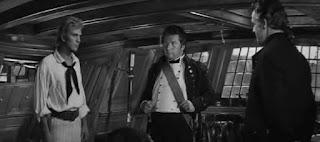
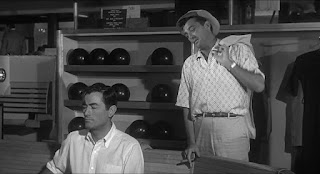
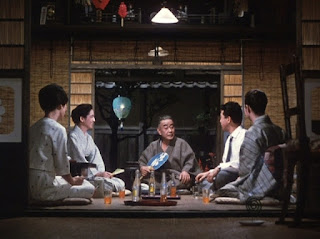


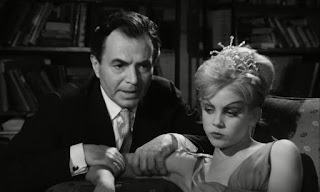
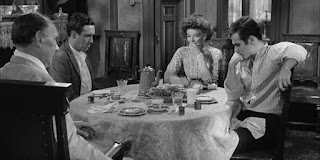


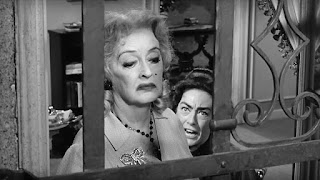
No comments:
Post a Comment